As krill oil gains popularity across the supplement space, you may be wondering why people choose to use it. Many gymgoers tend to think about whey protein, pre-workout, and even multivitamins as the main focus supplements. Cue krill oil. Krill oil has seen an increase in popularity as a means of ingesting more omega-3 fatty acids. Omega-3s are ALA, EPA, and DHA, and they may be helpful for the development of the eyes and brain. (1) Krill oil is often compared to many of the best fish oils, but krill oil may be more absorbable due to its phospholipid content and may provide more antioxidants. (2)
One study suggests that krill oil may be helpful for boosting brain function, reducing joint inflammation, and increasing the bioavailability of other supps, making them more available for our bodies. (3) Although there are many studies that demonstrate krill oil’s potential benefits, it can still be confusing as to what you should look for in your supp. It’s vital to keep ingredients, dosage, sustainability, and price in mind when making a pick. We picked the best krill oil supplements and geared them toward a diverse audience, including those who may need krill oil for heart health, lower cholesterol, or just a solid dose of omega-3s.
The 5 Best Krill Oil Supplements of 2025
- Best Krill Oil Overall: Transparent Labs Krill Oil
- Best Krill Oil on Amazon: Sports Research Krill Oil
- Best Value Krill Oil: BulkSupplements Krill Oil
- Best Krill Oil For Cholesterol: NOW Supplements Neptune Krill
- Best Krill Oil For Pescatarians: Viva Naturals Antarctic Krill Oil
Editor’s note: The content on BarBend is meant to be informative in nature, but it should not be taken as medical advice. The opinions and articles on this site are not intended for use as diagnosis, prevention, and/or treatment of health problems. It’s always a good idea to talk to your doctor before beginning a new fitness, nutritional, and/or supplement routine. Individual needs for vitamins and minerals will vary.
Best Krill Oil Overall: Transparent Labs Krill Oil
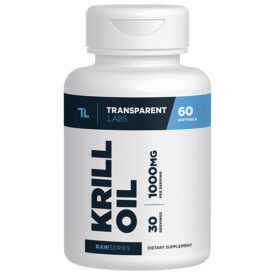
Transparent Labs Krill Oil is sourced from Antarctic krill. A high concentration of phospholipids may help the body better absorb the supplement's omega-3 fatty acids compared to fish oil. Also contains the antioxidant astaxanthin and natural vanilla flavor.
Specs
- EPA Per Serving: 120mg
- DHA Per Serving: 54mg
- Astaxanthin Per Serving: 100mcg
- Krill oil Per Serving: 1,000mg
- Price: $34.99
Pros
- One serving of this supplement packs 1,000 milligrams of pure krill oil with no other ingredients.
- This supplement is Informed Choice Certified.
- This only costs $1.16 per serving, which is relatively budget-friendly.
Cons
- This has some natural vanilla flavor added, which not all athletes might like.
- You do have to take two softgels per serving, whereas others only involve one pill per serve.
Transparent Labs Krill Oil supplies 1,000 milligrams of krill oil that’s rich in omega-3 fatty acids EPA and DHA. More specifically, you get 120 milligrams of EPA and 54 milligrams of DHA per serving. This supplement contains zero fillers, artificial sweeteners, or artificial colors.
“Transparent Labs provides more krill oil per serving than other krill oil supplements, and their product undergoes third-party testing. Transparent Labs Krill Oil is Informed-Choice certified,” says our expert reviewer, Chelsea Rae Bourgeois, MS, RDN, LD.
She scored the formulation a 4.5 out of 5. “There’s still a need for more research regarding krill oil and its purported health benefits,” she says. “However, based on the research we do have, Transparent Labs Krill Oil provides a decent dose of the omega-3 fatty acid alternative.”
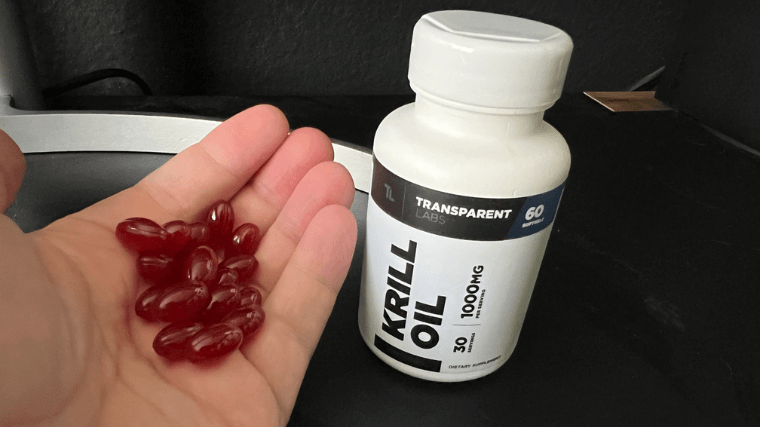
During testing, BarBend editorial member Randall Colburn enjoyed how small the capsules are, as well as the vanilla scent wafting off of them. “The softgel includes natural vanilla flavor, so my capsules came with a whiff of vanilla. I found it pleasant, but if the smell of vanilla puts you off, you’ll want to avoid,” he said. Ease of use scored a 5 out of 5.
He also scored taste a 5 out of 5, mainly since they have no taste. “They say it won’t leave an unpleasant aftertaste, and it doesn’t!” he said, adding that he experienced no fish burps or GI distress across his month of testing.
Value, however, scored a 3.5 out of 5. At $34.99 for 30 servings, this is one of the pricier krill oil supps we’ve come across. “I love that it’s third-party tested and sustainably sourced, but it’s just so expensive,” said Colburn.
Best Krill Oil on Amazon: Sports Research Krill Oil
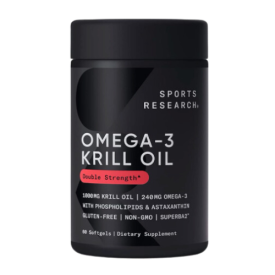
Each liquid softgel provides 1,000 milligrams of Antarctic krill oil and 240 milligrams of omega-3s with EPA, DHA, phospholipids, and astaxanthin.
Specs
- EPA Per Serving: 136mg
- DHA Per Serving: 60mg
- Astaxanthin Per Serving: 100mcg
- Krill Oil Per Serving: 1,000mg
- Price: $34.95
Pros
- Over 11,000 Amazon reviews with an average 4.6 out of 5 rating
- One softgel provides 1,000 milligrams of krill oil
- Sustainable practices
Cons
- Some customers complain about fishy container smell
- Large capsule may be hard to swallow for some
While the ethics of shopping on Amazon may be murky, there’s no denying how easy and convenient the online marketplace is. It’s a one-stop shop for your eclectic needs, whether that’s snorkeling gear, puppets, or, hey, krill oil, which is rich in omega-3 benefits. Sports Research Krill Oil has over 11,000 reviews on the platform, with an average rating of 4.6 out of 5. Each serving delivers 1,000 milligrams of krill oil, with 136 milligrams and 60 milligrams of EPA and DHA, respectively. It also comes sustainably sourced from the Antarctic Ocean.
Formulation scored a 4 out of 5 with our expert reviewer, Chelsea Rae Bourgeois. “While there’s still a need for more research regarding krill oil dosing, I like that Sports Research… contains minimal ingredients,” she said. “Depending on your goals, you may need to take multiple doses to experience the supplement’s benefits. Some research indicates that you may need 4 grams per day to benefit muscle function. A doctor or registered dietitian can help you choose the optimal dose for your needs.”
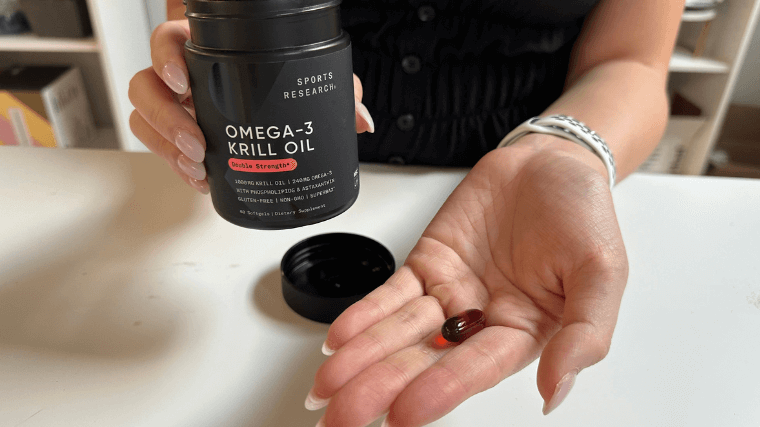
One softgel serving is all you need, though some customers have complained about the size of these pills. “Be forewarned that this is a large dose of krill oil and the capsules are large — almost 2 centimeters in length. If you can’t swallow a large pill, this is not for you,” mentioned a customer review on Amazon.
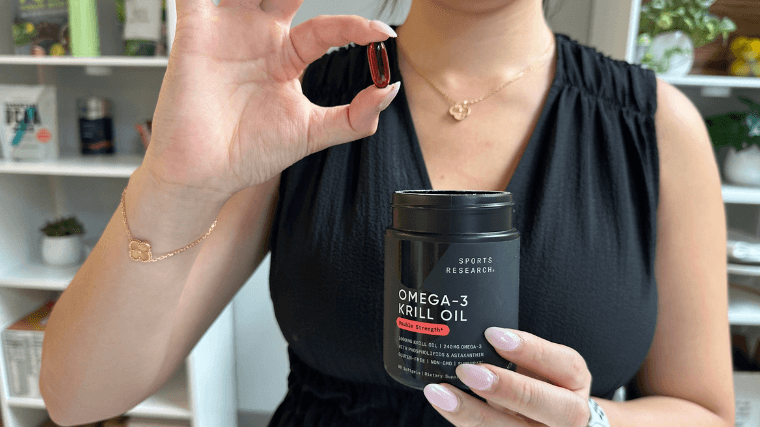
While we love that most customers noted they didn’t experience the dreaded fish burps, we did see a fair amount of comments about a fish-like odor coming from the container. One such review said, “There is a fishy smell in the bottle. And some fishy aftertaste, but nothing too crazy.” This is a small price to pay for a supplement that can potentially help increase strength and brain function, prevent coronary heart disease, and decrease inflammation. (15)(16)
Best Value Krill Oil: BulkSupplements Krill Oil
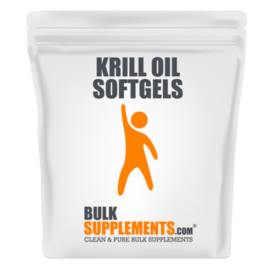
BulkSupplements sells their products, well, in bulk, meaning they offer a very cost effective krill oil option. Their product is lab tested for purity and potency.
Specs
- EPA Per Serving: N/A
- DHA Per Serving: N/A
- Astaxanthin Per Serving: N/A
- Krill Oil Per Serving: 1,000mg
- Price: $18.96
Pros
- At only $0.31 per serving, this is among the most budget-friendly picks on this list.
- This product is third-party tested.
- You get 60 servings in one bottle, so you don’t have to restock too often.
Cons
- These don’t have any sustainability certifications.
- BulkSupplements doesn’t specify how much EHA, DHA, or astaxanthin is in one serving.
One major factor when it comes to picking the right krill oil supplement for your lineup will be the price point. With a high-quality product and an excellent price tag, this krill oil is a top choice, in our opinion.
BulkSupplements Krill Oil contains 1,000mg of krill oil per each two soft gel serving. The capsule is made from gelatin, so it may not be suitable for those who practice pescetarianism. The beauty of BulkSupplements is that they have a varied selection of bulk buys. This krill oil supplement comes in 100, 300, and even 10,000 pill buying options.
Their krill oil is lab tested for purity and label accuracy, which is a somewhat underrepresented aspect across a lot of the krill oil market. They guarantee that their product is free from added sugars, soy, dairy, yeast, gluten, corn, and additives — a nice reassurance for people who have specific dietary needs. Despite paying heed to getting tested for label accuracy, it lacks any certifications for sustainability like some of its competitors. That isn’t a deal-breaker for some, particularly those who value cost-efficiency more, but it is something to be aware of.
When push comes to shove, it is going to be quite difficult to find a better bang for your buck when it comes to buying krill oil. The sheer volume available to purchase by BulkSupplements dwarfs their competitors. With that benefit does come tradeoffs, though. Sourcing krill from various sources means that there isn’t a specific origin to point to that will coincide with the batch you receive. The purity testing was enough to still earn a respectable rank on our list, and for anyone looking to buy in bulk, you found your match.
Best For Cholesterol: NOW Supplements Neptune Krill
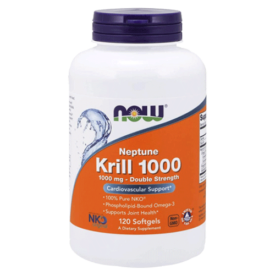
A high phospholipid krill oil that carries rigorous certifications for both sustainability and potency. Each single-softgel serving provides one gram of krill oil and 250 milligrams of Omega-3.
Specs
- EPA Per Serving: 135mg
- DHA Per Serving: 60mg
- Astaxanthin Per Serving: 360mcg
- Krill Oil Per Serving: 1,000mg
- Price: $17.39
Pros
- Those who specifically want to target lowering their bad cholesterol will like the additional benefit that an NKO source (like this one) may provide.
- This product is Friend of the Sea certified.
- You can buy this product on Amazon Prime for quick delivery.
Cons
- These are not vegan-friendly.
- There are few bulk options for this product.
Cholesterol is necessary for our bodies to build cells, but too much LDL cholesterol can be a bad thing. Heightened LDL cholesterol can generate heart problems and clog your arteries, and krill oil may be an effective way to help manage it. (6) NOW supplements designed their krill oil with cardiovascular health in mind.
NOW takes the unusual avenue of using Neptune Krill Oil (NKO), which may contain more phospholipids than most of its competitors. Research has found that these fats may be significant with regard to managing cholesterol and more effective at reducing glucose and triglycerides when compared to fish oil. (6) However, it is best to talk to your doctor before beginning any new supplementation regimen, especially if you have an existing condition like high cholesterol.
The bottle of NOW’s krill oil specifically states that it is designed with cardiovascular health in mind. One study found the effectiveness of NKO for combatting high cholesterol to be statistically significant. The study found that supplementing with NKO could be effective at reducing overall cholesterol, LDL, and triglyceride levels as well as increasing HDL levels. (6) In addition, this krill oil carries certifications from third-party tester UL and sustainability organization Friend of the Sea. This supp costs just around $0.50 per serving and each serving is two capsules.
Certified sustainable by Friend of the Sea and made with Neptune krill oil, this supp holds up against our other competitors. The potential to help with maintaining healthy cholesterol and the additional phospholipids make this a major contender for anyone seeking krill oil for heart health.
[Related: Types Of Supplements]
Best Krill Oil For Pescatarians: Viva Naturals Antarctic Krill Oil
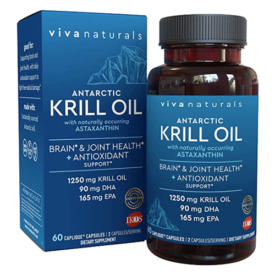
A particularly potent krill oil that carries multiple certifications for purity and sustainability. Pescetarian-friendly, each two-capsule serving provides 1,250 milligrams of krill oil.
Specs
- EPA Per Serving: 165mg
- DHA Per Serving: 90mg
- Astaxanthin Per Serving: 1.6mg
- Krill Oil Per Serving: 1,250mg
- Price: $26.95
Pros
- These capsules are made with tilapia gelatin and contain no pork or beef, so they’re safe for pescatarians.
- These are third-party tested.
- You can buy this krill oil in bulk.
Cons
- This is a pricier supplement than the others on this list.
- These require two pills per serving, as opposed to one, which some may not love.
Although many krill supplements seem like they would be acceptable for a pescatarian diet, many of the capsules contain gelatin. This pick is made from tilapia gelatin, making it a suitable choice for those avoiding any land animal products.
With an unusually high dose of 330 milligrams of omega-3s per serving, Viva Naturals stands out for its potency and for its rigorous testing: it’s not only been third-party tested for label accuracy, but it also carries certifications from both Friend of the Sea and The International Krill Oil Standard (IKOS). IKOS tests for contaminants and stability, as well as for label accuracy.
This pick contains a whopping 1,250 milligrams of krill oil per serving, which boasts 90 milligrams of DHA and 165 milligrams of EPA. They provide multiple buying options in the form of one bottle, four bottles, or six bottles, which provides the opportunity to save a decent chunk of change. If you opt for one bottle — which contains 30 servings — you’ll pay around $0.83 per serving. Whereas, if you choose to buy six bottles up front, the price per serving drops considerably.
Having a higher price tag and being larger in size versus comparable krill oil capsules are knocks against Viva Naturals. However, their certifications for sustainability and access are enough to slot them toward the top of our rankings — especially for our pescatarian friends.
[Related: Best Macros Calculator]
Benefits of Krill Oil Supplements
While most omega-3 supplements are derived from fatty fish like salmon, anchovies, and mackerel, krill are crustaceans that are usually sourced from Antarctica and the Southern Ocean.
I. Noyan Yilmaz/Shutterstock
They’re tiny, about one or two centimeters long, and as a trophic level connection — meaning they’re at the bottom of the food chain — they’re enormous in number. It’s estimated there are 379 million tons of Antarctic krill swimming around the ocean, making this species the one with the largest total biomass. Maybe we can learn a thing or two about bulking from them.
Fish Oil vs. Krill Oil
So why consider krill oil instead of fish oil? Both are great sources of the omega-3 fatty acids EPA and DHA, but there are a few reasons some folks prefer krill.
Krill oil contains more phospholipids, which may help the omega-3s to better absorb. (10)(11) It’s been shown in studies that while fish are one to one and a half percent phospholipids, krill are 40 percent phospholipids, making them far superior for those concerned with phospholipid intake. (9) Some research has found higher concentrations of EPA and DHA in participants taking krill oil versus fish oil, though more research is needed. (1)(12)(13)
Image via Shutterstock/Evan Lorne
Krill oil contains more antioxidants, like astaxanthin. In addition to potential benefits for heart health, astaxanthin acts as a natural preservative, so krill oil is less likely to go rancid on the shelf than fish oil. (14)
As they’re abundant in nature and reproduce quickly, there’s an argument that krill is a more eco-friendly option, although it’s important to look for certifications (see below) if sustainability is a priority. Because of their short lifespans, they’re less likely to be exposed to mercury and other toxic chemicals. Krill oil may also be less likely to produce the “fishy burps” that fish oil does.
How We Chose the Best Krill Oil Supplements
Although it may be surprising to some, there is actually a lot of variety when analyzing the reasonable options on the market for krill oil. Different producers can aim their products at offering something specific that they feel the rest of the market is lacking. That is good news for consumers, but it also means there are more variables to take into account when trying to make the most beneficial purchase. Based on supplement testing methodology, here is what we looked at when selecting our top choices.
Omega-3 Content
No secret here, if someone is looking to purchase krill oil, there is likely to want some supplementation to their omega-3 intake. When grading each product, one should consider what the intent of the manufacturer is — although all krill oil will have omega-3 content, it may not be the only focus — and how heavy of a dose is provided per serving.
Dosage
Dovetailing off of omega-3 content, understanding the dosage of anything else added to the formula is also something to be keenly aware of. For example, if a consumer is looking to increase their omega-6 intake alongside their omega-3 intake, there may be large discrepancies in the dosage of omega-6 across products. This may be true for DHA and EPA, phospholipids, or astaxanthin dosages as well.
Image via Shutterstock / Farion_O
Additionally, dosage helps signify the cost efficiency of a product. The higher the dose (assuming that’s desirable) paired with a higher amount of servings at a lower cost will obviously rank higher and have a larger impact on a consumer’s purchase.
[Related: Nutrition For Bulking: 10 Tips For Intelligent Muscle Gain]
Third-Party Purity Testing and Sustainability
If there is a krill oil supplement on the market and it hasn’t been third-party tested for purity and label accuracy, it is probably going to fall behind those that have — it certainly affects our ranking. Knowing that you are getting what you pay for is important, not only from a cost-efficiency standpoint but also so you know what you’re putting into your body. Label accuracy is another thing that products can be third-party tested for and they should be. Unfortunately, not all products are.
Image via: margouillat photo / Shutterstock
This is not to say that a supplement manufacturer would print inaccurate labels, it just offers peace of mind knowing that the dose of a particular ingredient listed on a label is the dose you are consuming. When it comes to sustainability, this isn’t a requirement of every consumer so we can’t have it influence our rankings as heavily, but we do have to take it into consideration.
Having sustainability certification or not doesn’t necessarily have a negative effect on the product itself, but having transparency around the production of something you will spend money on and consume can certainly be worth knowing.
How Much Do Krill Oil Supplements Cost?
Krill oil is a rather cost-effective fish oil supplement that still carries a host of potential benefits you might expect from more expensive fish oils, such as supporting brain function, inflammation, and cardiovascular health. While some omega-3 supplements can cost an arm and a leg, or more appropriately, a fin and a tail, krill oil supps tend to be fairly inexpensive.
| Best Krill Oil Overall | Transparent Labs Krill Oil | $34.99 |
| Best Krill Oil on Amazon | Sports Research Krill Oil | $34.95 |
| Best Value Krill Oil | BulkSupplements Krill Oil | $18.96 |
| Best Krill Oil for Cholesterol | NOW Supplements Neptune Krill | $17.39 |
| Best Krill Oil for Pescatarians | Viva Naturals Antarctic Krill Oil | $26.95 |
Krill oil supplements can range in price depending largely on how many servings are included in the container, as well as the potency of each serving. You’ll generally find that krill supps cost somewhere around $18 to $50 with the price per serving being relatively low at about $0.40 to $0.83.
What To Consider Before Buying Krill Oil Supplements
When picking a krill oil supplement, you will want to consider a few varying factors to make sure you’re selecting a supp that best suits your needs. Price, dosage, type of krill, sustainability, third-party testing, and serving size are a few of the important factors you’ll want to weigh before your purchase.
Price
The price of krill oil supplements will definitely vary. Some of the major factors that will influence price will be ingredient lists, dosages, certifications, and sustainability practices. Generally speaking, the price of a supp will spike with the addition of more ingredients. It will also vary depending on the dosage. If a supp has a much higher dose of krill oil or omega-3s compared to another pick, it will probably be more expensive.
Similarly, any sustainability measures taken or third-party testing done on the supp will usually up the price of the product. These factors may not be important to some people, but for others, they may be uncompromisable components to picking a krill oil that’s best for them.
Image via Shutterstock / Africa Studio
It may be that you want to avoid mercury, support sustainable fishing practices, or want third-party testing done to ensure the effectiveness of your supp. Either way, these generally tend to up the price of a supplement. While krill oil does have some interesting evidence suggesting its superiority to fish oil, it’s worth remembering that fish oil is considerably cheaper. Even if krill oil may absorb better, the cents-per-gram-of-omega-3s’ value is better with fish oil.
Dosage
Each of our picks packs distinctly different dosages for almost every ingredient. They have varying dosages for krill oil content, omega-3s, EPA, DHA, phospholipids, and astaxanthin. Some may skip on one or more of those ingredients entirely. It’s always best to think about what your needs are for krill oil — lowering cholesterol, joint health, brain function, etc. — and optimize dosages for these specific ingredients based on your goals.
Image via Shutterstock / skogit
Always be sure to read the label closely: The amount of krill oil is always more than the actual dose of omega-3 fatty acids. That isn’t really ever explicit in product labeling, so it is good to be conscious of it when making the most educated purchasing decision.
Type of Krill
We provided options on this list that contain regular krill oil and Neptune krill oil (NKO). Although they are similar, it’s best to opt for NKO if your main focus is phospholipid intake. Although the choice of which type of krill oil you want to add to your stack may not make or break the benefits you reap, it’s good to be mindful if you have a certain goal in mind.
Sustainability Practices
It’s not a priority for everyone, but many krill oils stand out in the market with certifications from organizations that verify their practices with regard to environmental sustainability. The International Krill Oil Standard (IKOS), Marine Stewardship Council (MSC), and Friend of the Sea are all good options.
Third-Party Testing
This may not be important to some, but for others, third-party testing may be a major component of how you choose your krill oil supp. Label accuracy and purity can majorly affect the supplement’s integrity, which can be important for some folks. You may be vehemently against a krill oil supplement that contains mercury, or that isn’t tested for quality. Each person’s needs will be different, but it is worth thinking about whether these factors play into your needs. If a supplement has been third-party tested, we’ve called it out on this list.
[Related: Lifter’s Guide To Magnesium]
Krill Oil Supplements FAQs
Is krill oil necessary for me to take?
Although krill oil isn’t necessary to take, it may be helpful for a host of reasons. Some of the conditions it may benefit are inflammation, heart conditions, mood disorders, schizophrenia, and depression. (4) It is extremely important to consult with your healthcare provider before self-prescribing or replacing existing medication with krill oil.
What is the best krill oil supplement?
A lot of people have preferences and opinions about which krill oil supplements are the best, and you’ll likely never get the same answer from two people. Our favorites come from Transparent Labs and Sports Research.
Why should I take krill oil instead of fish oil?
Krill oil has its own set of unique benefits that may make it a better choice for you over fish oil or omega-3 supplements. Krill oil has a higher count of phospholipids, which may be beneficial to those who suffer from high cholesterol or need to lower LDL and triglycerides. (6) Krill oil also tends to have less of a fishy taste than fish oil, so if that’s something that is holding you back from taking an omega-3 supplement, krill oil may be a great option to replace fish oil.
Is taking krill oil bad for the oceans?
If sustainability is something that you’re passionate about, there are ways to supplement with krill oil that are ocean-safe. You’ll want to choose a krill oil supplement that has been certified by either the International Krill Oil Standard (IKOS), Marine Stewardship Council (MSC), or Friend of the Sea. This will allow you to get your daily dose of krill oil without compromising your personal set of ethics.
References
- Köhler A, Sarkkinen E, Tapola N, Niskanen T, Bruheim I. Bioavailability of fatty acids from krill oil, krill meal and fish oil in healthy subjects–a randomized, single-dose, cross-over trial. Lipids Health Dis. 2015 Mar 15;14:19. doi: 10.1186/s12944-015-0015-4. PMID: 25884846; PMCID: PMC4374210.
- Andraka JM, Sharma N, Marchalant Y. Can krill oil be of use for counteracting neuroinflammatory processes induced by high fat diet and aging? Neurosci Res. 2020 Aug;157:1-14. doi: 10.1016/j.neures.2019.08.001. Epub 2019 Aug 22. PMID: 31445058.
- Krupa K, Fritz K, Parmar M. Omega-3 Fatty Acids. [Updated 2022 Jul 12]. In: StatPearls [Internet]. Treasure Island (FL): StatPearls Publishing; 2022 Jan-. Available from: https://www.ncbi.nlm.nih.gov/books/NBK564314/
- Cardoso C, Afonso C, Bandarra NM. Dietary DHA and health: cognitive function ageing. Nutr Res Rev. 2016 Dec;29(2):281-294. doi: 10.1017/S0954422416000184. Epub 2016 Nov 21. PMID: 27866493.
- Mozaffarian D, Wu JH. (n-3) fatty acids and cardiovascular health: are effects of EPA and DHA shared or complementary? J Nutr. 2012 Mar;142(3):614S-625S. doi: 10.3945/jn.111.149633. Epub 2012 Jan 25. PMID: 22279134; PMCID: PMC3278271.
- Bunea R, El Farrah K, Deutsch L. Evaluation of the effects of Neptune Krill Oil on the clinical course of hyperlipidemia. Altern Med Rev. 2004 Dec;9(4):420-8. PMID: 15656713.
- Hals PA, Wang X, Xiao YF. Effects of a purified krill oil phospholipid rich in long-chain omega-3 fatty acids on cardiovascular disease risk factors in non-human primates with naturally occurring diabetes type-2 and dyslipidemia. Lipids Health Dis. 2017 Jan 17;16(1):11. doi: 10.1186/s12944-017-0411-z. PMID: 28095913; PMCID: PMC5240272
- Küllenberg D, Taylor LA, Schneider M, Massing U. Health effects of dietary phospholipids. Lipids Health Dis. 2012 Jan 5;11:3. doi: 10.1186/1476-511X-11-3. PMID: 22221489; PMCID: PMC3316137.
- Kubala, J. (2020, August 25). Omega-3s and phospholipids: How are they linked? Healthline. Retrieved September 27, 2022, from https://www.healthline.com/health/nutrition/the-phospholipids-and-omega-3-connection
- Schuchardt JP, Schneider I, Meyer H, Neubronner J, von Schacky C, Hahn A. Incorporation of EPA and DHA into plasma phospholipids in response to different omega-3 fatty acid formulations–a comparative bioavailability study of fish oil vs. krill oil. Lipids Health Dis. 2011 Aug 22;10:145. doi: 10.1186/1476-511X-10-145. PMID: 21854650; PMCID: PMC3168413.
- Maki KC, Reeves MS, Farmer M, Griinari M, Berge K, Vik H, Hubacher R, Rains TM. Krill oil supplementation increases plasma concentrations of eicosapentaenoic and docosahexaenoic acids in overweight and obese men and women. Nutr Res. 2009 Sep;29(9):609-15. doi: 10.1016/j.nutres.2009.09.004. PMID: 19854375.
- Ulven SM, Kirkhus B, Lamglait A, Basu S, Elind E, Haider T, Berge K, Vik H, Pedersen JI. Metabolic effects of krill oil are essentially similar to those of fish oil but at lower dose of EPA and DHA, in healthy volunteers. Lipids. 2011 Jan;46(1):37-46. doi: 10.1007/s11745-010-3490-4. Epub 2010 Nov 2. PMID: 21042875; PMCID: PMC3024511.
- Ulven SM, Holven KB. Comparison of bioavailability of krill oil versus fish oil and health effect. Vasc Health Risk Manag. 2015 Aug 28;11:511-24. doi: 10.2147/VHRM.S85165. PMID: 26357480; PMCID: PMC4559234.
- Pashkow FJ, Watumull DG, Campbell CL. Astaxanthin: a novel potential treatment for oxidative stress and inflammation in cardiovascular disease. Am J Cardiol. 2008 May 22;101(10A):58D-68D. doi: 10.1016/j.amjcard.2008.02.010. PMID: 18474276.
- Harris W. S. (2004). Fish oil supplementation: evidence for health benefits. Cleveland Clinic journal of medicine, 71(3), . https://doi.org/10.3949/ccjm.71.3.208
- Ghasemi Fard, S., Wang, F., Sinclair, A. J., Elliott, G., & Turchini, G. M. (2019). How does high DHA fish oil affect health? A systematic review of evidence. Critical reviews in food science and nutrition, 59(11), 1684–1727. https://doi.org/10.1080/10408398.2018.1425978